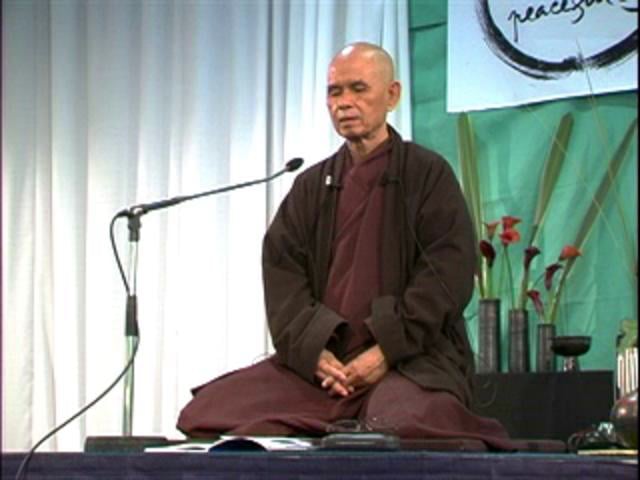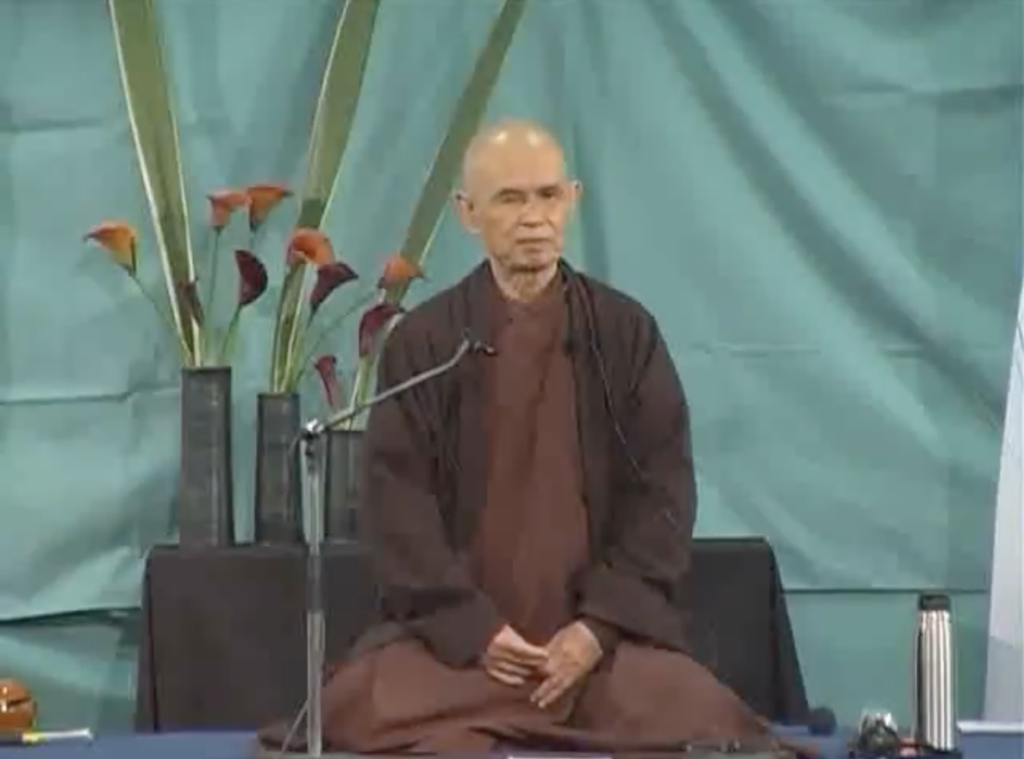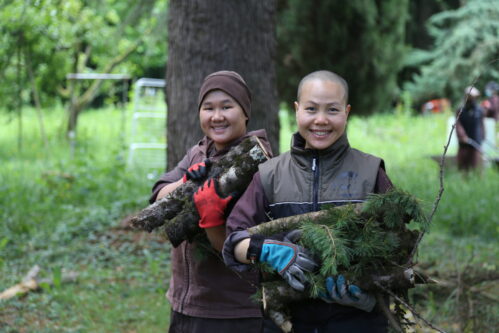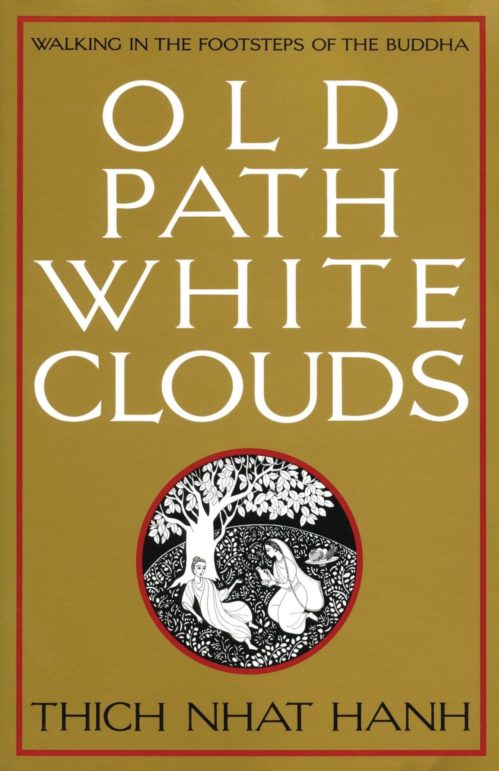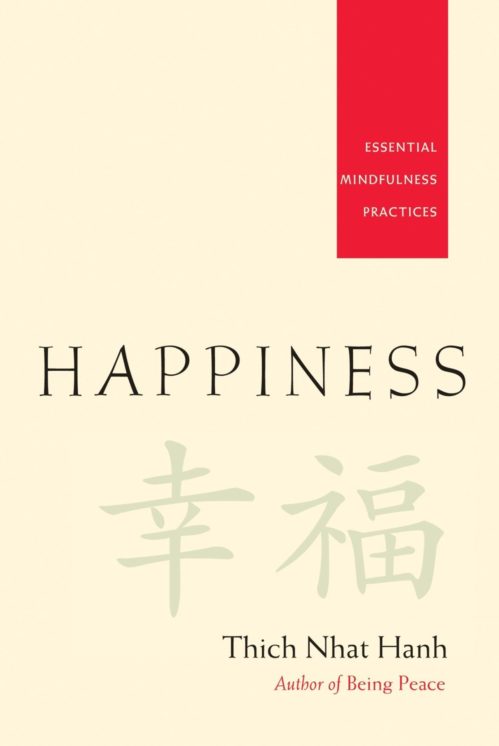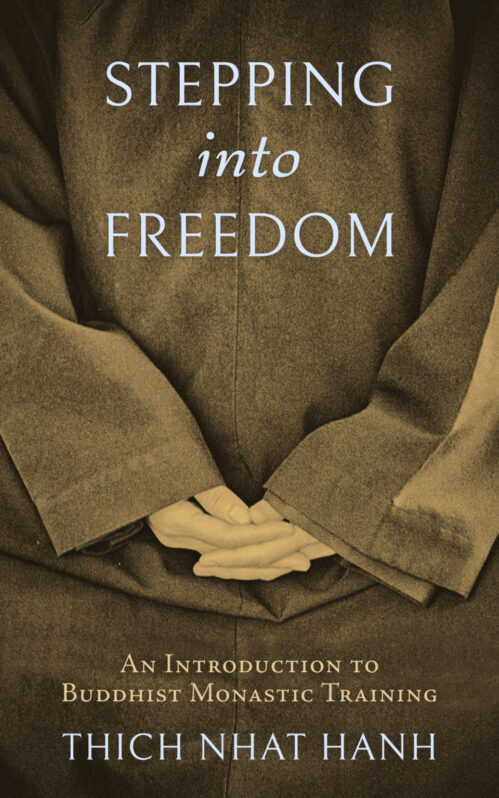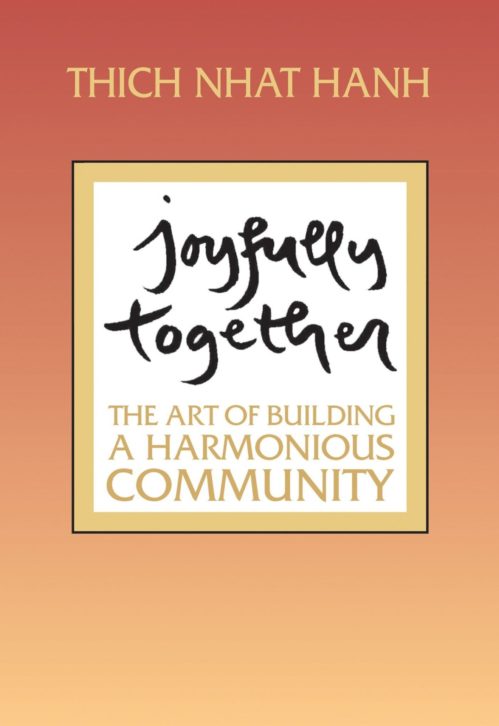Information on joining the international monastics community either with a lifetime commitment or through the “Five-Year Program”.
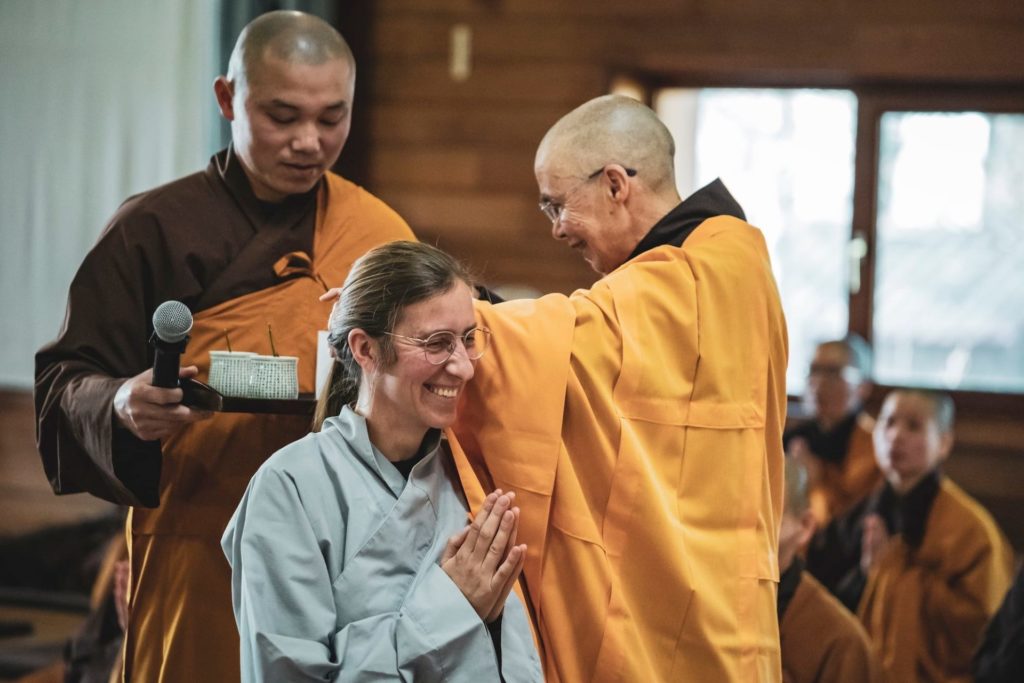
Becoming a Monastic
Creating an engaged, international monastic community present all over the world, was one of our teacher Thay’s dearest dreams.
Those with a sincere aspiration to cultivate understanding and compassion as their only career, are welcome to join our monastic community. You would live, learn, and practice in one of our monasteries in Europe, America or Asia. Our growing sangha presently numbers over 700 monastics spread out among these three continents.
When we train as a monastic we have the opportunity to find the root of our freedom, solidity, joy and happiness, and to help our society. When we ordain and wear the brown robe we learn to cut through our illusions and our afflictions. We enter a life of practice and service, tasting simplicity and helping people.
Becoming a Monastic: with a lifelong commitment or joining the “Five-Year Program”
If you have a deep, clear and strong aspiration to live the life of a monk or a nun for your whole life, you are welcomed to make a request to join our monastic community based on a lifelong commitment. In the Buddha’s teachings, we often hear that one life is not enough to realize our path of practice and service. The monastic path is indeed very wide and takes us to the depths of our being, and we never get to its end. The work of relieving the suffering of the world accomplished by the monastic sangha is also endless.
If you do not have the aspiration of a lifelong commitment to the monastic path but you do have a deep desire to experience this life and undergo monastic training for some years, you might like to consider the “Five-Years Monastic Training Program”. Our teacher Thay created this new Dharma door in 2010, especially for young people in the West.
Five years of monastic training is a great chance for you to learn how to live your life meaningfully, to discover brotherhood and sisterhood, and to make possible right here and right now the social change you have always dreamed about. Tasting the simple life of a monk or a nun and cultivating your spiritual life, you will be able to assist your elder brothers and sisters in organizing retreats and events all over the world. You will be able to share your practice and transformation and help a great deal of people, including children, couples and families.
The information shared in the sections below, unless specified, applies to both the lifelong commitment and the Five-Years Program.
In our practice centers, monastics joining the lifelong commitment and the Five-Years Program live together and receive the same training. Those joining the Five-Years program can decide whether to return to lay life or to remain on the monastic path once the five years come to an end.
The Plum Village Monastic sangha
Our monastic sangha represents many countries, and has its roots in a Vietnamese Buddhist tradition. There is also a wide variety of ages, from 15 to 84, though most of the monastics are in their 20’s and 30’s. To become a monastic in our community requires openness and the ability to embrace cultural diversity. The communal languages are Vietnamese, English, and the local language of the monastery (e.g. French). So, one must be fluent in at least one of these languages.
Basic Requirements
- For those with a life-long commitment: Becoming a monastic is a deep and lifelong commitment to not just a way of living, but also training to teach the Dharma to lay persons and fellow monastics. It is a serious undertaking of many years. Because of this extended period of training, we usually cannot accept applicants over 50 years of age.
- For those joining the Five-Years Program: From 17 – 35 years old. If you are under 18, you must have permission from your parents.
For both life-long and Five-Years commitment:
You may be single or divorced, but not currently in a romantic relationship. Monks and nuns in the Plum Village tradition are celibate and make a deep commitment to the community. They live, practice, and teach as a community and not as individuals.
Your body and mind should be sound enough to support your training. A medical examination will be required for you to enter the program.
You must have no debt or financial ties. As monastics we take refuge in the sangha and do not have debt or hold personal bank accounts and/or credit cards. We practice to rely fully on the sangha for all our needs and sustenance (food, clothes, medicine, and shelter). For the 5 year program you can freeze any bank accounts that you have and close credit card accounts.
Commitment to study, practice, and serve. Our training is to flow as a sangha. You commit to learn how to practice as a community and to follow the guidance of the sangha, including attending all sangha activities.
You must let go of personal possessions. As part of your training you will be asked to release items such as laptops, cellphones, etc. and to come into the community with empty hands and an open heart.
Family visit. You can visit your blood family members for 14 days after training for two years as a novice. You can keep in contact with them, care for them, and share your happiness with them by writing them letters, or emails and calling them. We welcome blood families to visit the monastery and you may go to them in times of need.
Requesting Ordination
Inquiry Period:
As a candidate for the novitiate you should stay in one of the Plum Village monasteries for at least three months. In this way you can have direct experience of monastic, communal life and the sangha can observe whether or not you have a strong monastic vocation. After the first two weeks of your stay as a regular practitioner, you are welcome to write an aspiration letter to request an extended stay, after at least two months you are welcome to write an aspiration letter to express your wish to join the monastic life. As soon as the sangha has received your letter and shared it with the community, you become an aspirant, which means simply that you are requesting ordination and the sangha is aware of it
When you are sure you want to ordain, you can write a letter to the sangha. In the letter you should share about your personal background, your experiences with the practice, and your aspirations for becoming a monastic. You are also invited to say whether you aspire to join the monastic sangha for life or for five years. The sangha will then meet to consider your request and at that time may offer you guidance, such as, on how to improve your wholesome qualities and how to transform your unskillful ones.
Aspirant period (1 year)
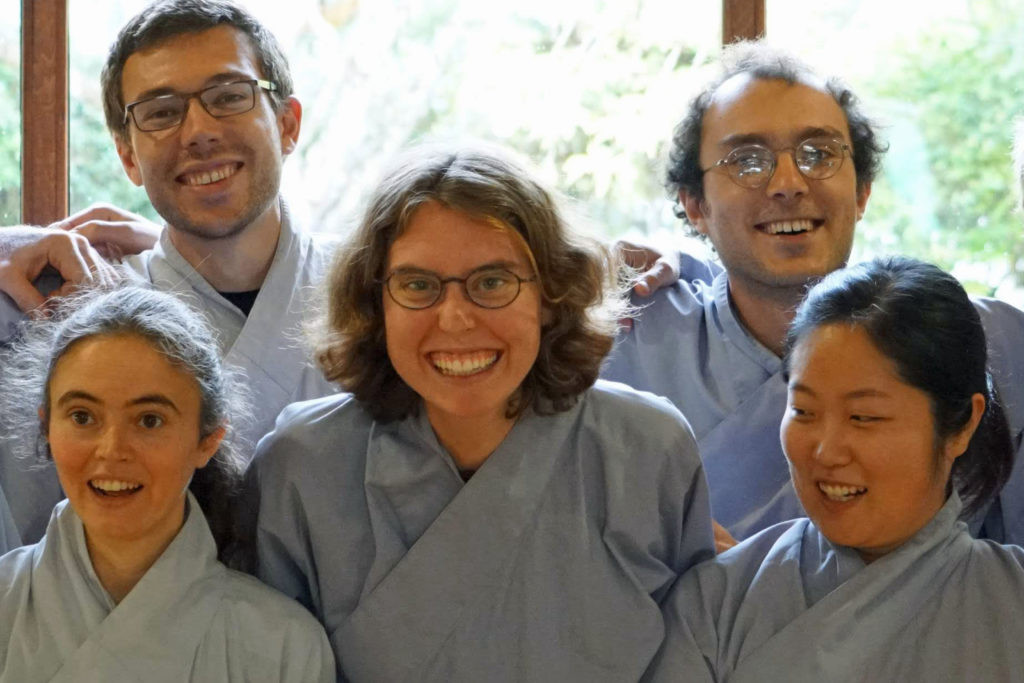
Once approved for the program, you will be given an aspirant robe to wear during your training as an aspirant, and move into the aspirant quarters with the other trainees. A mentor will guide you in this initial period of training and transition into monastic life.
Your training is not just about accumulating knowledge and ideas. Rather, there are practices that you learn and apply in daily life in order to transform suffering and grow in understanding and compassion. In this period you will be asked to release your possessions and worldly commitments so that you can be free enough to dedicate your time and energy to practicing and living as a monastic.
After up to one year of training, the monastic community will meet to look deeply at your practice and your aspiration. On the basis of this, the community will decide whether you are ready to be ordained as a novice.
Most monastics are ordained in the Plum Village Practice Center in France. Some are also being ordained in Thailand and in the U.S.. If you are not sure about entering monastic life, you are free to take your time and practice as a layperson in one of our centers. However, long-term stays must be approved by the respective monastery.
Novice period (3 years)
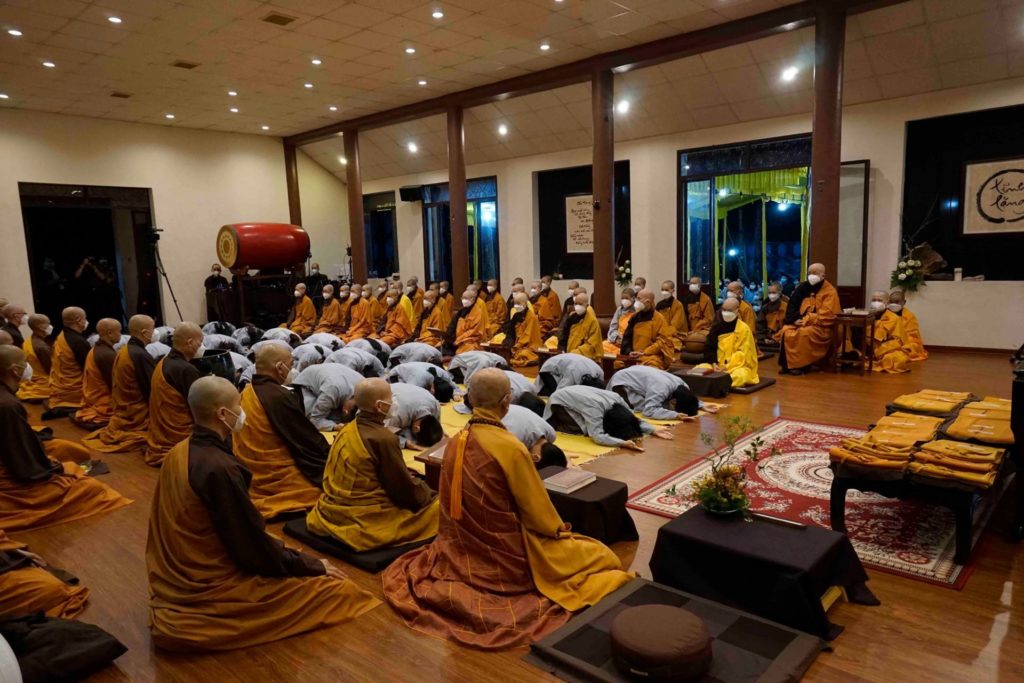
Whether you join monastic life through the 5-Years Program or the lifelong commitment, after one year as an aspirant, you will be ordained as a novice monk or nun for around 3 years.
Once ordained as a novice, you will be invited to move into the monastic residence to live with the other monks or nuns.
Your training will focus even more on monastic life based on the novice training book, “Stepping Into Freedom”, and on the book about community living, “Joyfully Together”. Monastic training is fundamentally different from academic pursuit at a university. The four pillars of Plum Village life are: practice, study, work and play. We try to maintain a balance in these areas of our lives. Monastics are reminded to come back to the basic practices of mindful breathing, walking, eating, and listening to the bell, transformation and healing throughout the whole of our life of practice. You will train to slowly develop mindfulness, concentration and insight, based on the fine manners and precepts of a novice monk or nun, which take their concrete expression through the daily actions of body, speech, and mind.
As a novice, you do not have to wait until full ordination or until you are a Dharma teacher in order to help people. Right in the first few months, your practice of mindful walking, mindful breathing and your peace and happiness can already be inspiring to many people who come to the practice center. Even very young novices can already be sangha builders, bringing happiness to many people.
You will share a room with two, three, or four other monastics and have a mentor to guide your practice. After three or four years, you may be ready for full ordination into the Bhikshu or Bhikshuni community, with the sangha’s approval.
When you are ordained as a novice, you make a commitment to stay with the Plum Village sangha. The sangha is your family and our monasteries are your home. Even when difficulties arise, we do our best to live in harmony with our brothers and sisters.
Your immediate family is welcome to visit you and they do not have to contribute to expenses. You can also have leave to visit your family every two years, or, in the case of an emergency, sooner.
Full ordination
For this period, you will enter the Bhikshu or Bhikshuni sangha and practice as a full-fledged member of the monastic community, observing the higher precepts of a monk or a nun. You will have even more opportunities to engage in the work of sharing the practice, helping people, organizing events, as well as going deeper in the monastic training and building the monastic and multi-fold communities.
If you are in the Five-Years Program, this last year will conclude your training period. You will then be free to choose whether to remain on the monastic path or to go back to lay life. If you go back to lay life, there will be a ceremony organized for you to give back the monastic robe. If you received the 14 Mindfulness Trainings as a monastic during the Five-Years Program, you will be able to keep them and practice as a lay member of the Order of Interbeing. If you decide to stay on the monastic path, you are invited to express your wish to the community in order to receive the agreement and support of the community.
May you fulfill your noble aspiration, for the benefit and happiness of all living beings!


